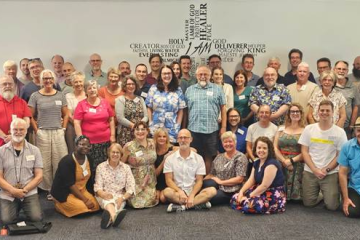11 August 2025 – The voice of Bathsheba – 2 Samuel 11:26-12:13a
Our reading today is part two of the story we heard two weeks ago – of how David became so acclimatised to being king that he became the kind of king the prophet Samuel had warned the people of so many years ago; a king who was a ‘taker’, who would take their sons and daughters, who took another man’s wife, in this story, and then the life of her husband. This is highlighted in 2 Samuel 11:4 where, “David sent messengers to ‘get her’” The Hebrew is stronger; ‘to take her’. And the same phrase is used in today’s reading; when the rich man ‘takes’ the poor man’s lamb (12:4). But we are told in verse 27, God was displeased – again the language is stronger, God viewed these acts as evil – and sends another prophet, Nathan, to expose this evil and offer David a chance at redemption.
This reading focuses on David and Nathan. Bathsheba is only mentioned briefly and a few years ago, I saw, at the National Library, a copy of the Book of Hours with an image of Bathsheba that had been vandalised by pious monks. So this morning, I don’t want to just mention Bathsheba briefly or to wipe her from the page. Instead, I want to tell this story of sin and confrontation and confession and consequences in her voice.
I am Bathsheba, daughter of Eliam, granddaughter of Ahithophel. Before I was the wife of Uriah the Hittite or the wife of King David of Israel, my identity was my father’s and grandfather’s names. Their deeds are recorded by the scribes – my father for his soldiering – he was one of the king’s ‘famous thirty’ – and my grandfather for his counsel – a skill that lifted him high and brought him low. There is no chronicler, however, who records my mother’s name or that of my grandmother.
But I rejoice that you know my name – Bathsheba. It means ‘daughter of the oath’ or ‘daughter of the covenant’ – the covenant God made with Abraham. Mine is one of the few women’s names recorded in the Hebrew Scriptures – 100 or so women’s names and over 1000 men’s names. It is rare that you hear our voices.
And who would believe us if you did? For centuries the church has equivocated about calling the actions of my lord the king, rape. For how can this story about David the sinner be reconciled with the David of legend? How do we hold together rapist and murderer with hero, writer of psalms, beloved of God? …No. No one would have believed me.
We are so sure that we can tell evil from good, truth from falsehood, reliable witness from unreliable. We are so sure – like the kings who go predictably to war each spring – that we know who the enemy is. But we should not be so confident, for that year the king found the enemy within the palace walls, for he was the enemy.
Some deal with this difficult story by staying silent. The scribes of Chronicles simply leave it out.
Others claim that what happened was not rape. They use softer words – adultery, infidelity. Perhaps we were in love, they say. Surely love cannot be sin.
And others lay the blame at my naked feet. Painting me as a seductress, exhibiting myself on a rooftop – rather than being seen from one – and scratching away at the image of me in their prayer books lest they, too, are led into sin by a woman!
But God knew. God saw. This was the first grace for me that God heard my cries of lament for all that had been lost and sent the prophet Nathan to my lord the king.
You might find this hard to hear, but in the story the prophet told the lamb is property – just as I was the property of my father and of my husbands. But what Nathan described so skilfully was the great injustice – the terrible act of taking – that my lord had carried out, and – this was the second grace for me – the silence surrounding the king’s sins was ended.
I am thankful that – like the prophet Nathan – there are people speaking up in your time about these things. There are so many stories of lives that are lost. They say one woman is killed every week, or even every 4 days, in your time – so this taking continues, but as the silence is broken, as the abuses are exposed, as the underlying attitudes are questioned, we can start arresting the terrible statistics.
Some would prefer to keep such things hidden. But I remember my grandmother, crouched beside the kitchen fire, light flickering on her face, telling me that sin was like one deep crack in a pot. It would grow, splintering and splitting, until the pot must be thrown away.
The king confessed his sin. He acknowledged the evil he had done. No one doubted his sincerity. But sin has consequences and the cracks from his sin continued to spread and our son was caught in the disintegration.
Many times, in the years since, I have railed at God for acting like my lord the king had done. Misusing power to take an innocent’s life. Those have been the darkest times. Other times I have wondered if the prophet was only speaking what would have been anyway. For the child was frail. But at other times – and this is what has held me together all these years – I know that first grace again – that deep as a mother’s love God loved my child and felt with me the agony of losing a first-born son.
And there was another – an almost unwelcome – grace that I experienced. As I watched my lord the king fast and pray and plead with God for the life of our child, despite what the prophet had said, I saw that faith could still flicker in the heart of someone who knew they had done wrong; that faith could outlast the suffering; that although sin had consequences, we could still cling to God; that God in God’s mercy does not abandon any of us.
As I said, this was a strange grace. And this was my grace. It may not be the grace experienced by another. But when our child died, we grieved together, and made a new beginning together, and the child that was born we called – Shalom – Peace. Or as you know him – Solomon.
But the sword that devours now one and then another (how my lord the king was to regret that quick and evil dismissal of Uriah’s death) continued to devour. First Amnon raped Tamar, then Absalom murdered Amnon, then Absalom rebelled against David, aided by my grandfather who could not forget the dishonour done to our family.
I am an old now, and soon I will sleep, like my lord the king, with my ancestors, but again, who would believe my story now? That my son, Solomon, would sit on the throne and that I, would be given a throne beside him; that I, like my grandfather, would counsel a king!
Perhaps you will dismiss this as the dream of an old woman, but as I look along the cracks running through this story, the sword that devoured one and then another, the sons and daughters lost, the mothers whose souls have and will be pierced with swords; I also see – glowing, shining, in the cracks – God’s grace – grace that, firstly, sees and shares all our suffering, grace that, secondly, confronts and exposes evil, and grace that continues to offers abundant mercy, that, like the lamb who was slain, I have become a conduit of life and wholeness and peace for all people for all time.
I am Bathsheba – named after the promise, the covenant of God’s grace.
As we reflect on God’s grace and how it runs through the stories of our lives, let us read the words of Psalm 51 and then sing them together.
Psalm 51
To the leader. A Psalm of David, when the prophet Nathan came to him, after he had gone in to Bathsheba.
1 Have mercy on me, O God,
according to your steadfast love;
according to your abundant mercy,
blot out my transgressions.
2 Wash me thoroughly from my iniquity,
and cleanse me from my sin.
3 For I know my transgressions,
and my sin is ever before me.
4 Against you, you alone, have I sinned
and done what is evil in your sight,
so that you are justified in your sentence
and blameless when you pass judgment.
5 Indeed, I was born guilty,
a sinner when my mother conceived me.
6 You desire truth in the inward being;[a]
therefore teach me wisdom in my secret heart.
7 Purge me with hyssop, and I shall be clean;
wash me, and I shall be whiter than snow.
8 Let me hear joy and gladness;
let the bones that you have crushed rejoice.
9 Hide your face from my sins,
and blot out all my iniquities.
10 Create in me a clean heart, O God,
and put a new and right[b] spirit within me.
11 Do not cast me away from your presence,
and do not take your holy spirit from me.
12 Restore to me the joy of your salvation,
and sustain in me a willing[c] spirit.


